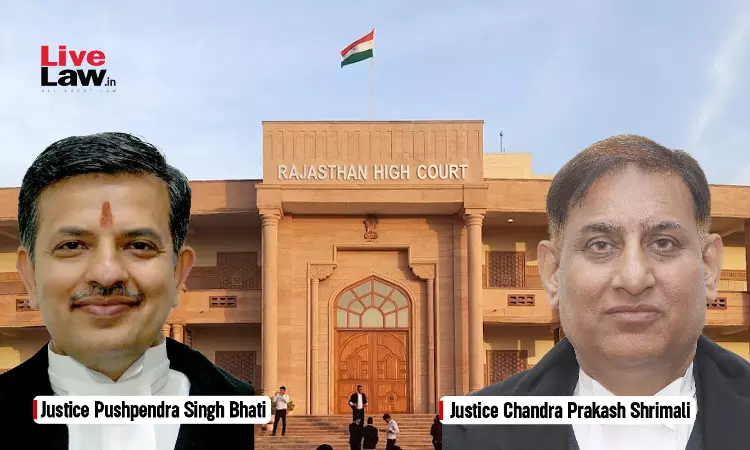- Home
- /
- High Courts
- /
- Rajasthan High Court
- /
- Rajasthan Minor Minerals Rules |...
Rajasthan Minor Minerals Rules | Rajasthan High Court Upholds Constitutional Validity Of Penalty Imposed For Extension Of LOI Under Rule 16(2)
Nupur Agrawal
19 Jun 2025 12:15 PM IST
Upholding the constitutional validity of the Proviso 3 to Rule 16(2) (“the Provision”) of the Rajasthan Minor Mineral Concession Rules, 2017 (“2017 Rules”) Rajasthan High Court ruled that once the rule was held to be constitutionally and statutorily valid, any action by the State in furtherance thereof could not be faulted merely on grounds of hardship or inconvenience.The...
Upholding the constitutional validity of the Proviso 3 to Rule 16(2) (“the Provision”) of the Rajasthan Minor Mineral Concession Rules, 2017 (“2017 Rules”) Rajasthan High Court ruled that once the rule was held to be constitutionally and statutorily valid, any action by the State in furtherance thereof could not be faulted merely on grounds of hardship or inconvenience.
The Provision provided for extension of the Letter of Intent (LOI) issued subject to payment of a penalty at the rate of 10% of the annual dead rent for every month for such extended period from the date of issuance of LOI.
The division bench of Dr. Justice Pushpendra Singh Bhati and Justice Chandra Prakash Shrimali was hearing a challenged against the Provision by the petitioner on whom a penalty of around 15 lakhs was imposed on his failure to submit the Environment Clearance Certificate within six months of issuance of the LOI.
The petitioner argued the Provision to be manifestly arbitrary and unreasonable on the ground that it imposed mandatory penalty without vesting any discretion on the competent authority to consider the reasons or circumstances for such delay that might be beyond the control of the petitioner like prolonged and complex procedure involved in obtaining mandatory approvals.
It was submitted that there was no delay or inaction on part of the petitioner in relation to obtaining the Certificate. The same was applied for in 2014, immediately after LOI was issued. However, it was issued only after a period of more than 2 years, in 2017. Hence, the delay was purely administrative in nature and entirely beyond the petitioner's control.
After hearing the contentions, the Court rejected the challenge against the Provision of being manifestly arbitrary, unreasonable and ultra vires the constitution for the following reasons.
Firstly, the Court highlighted that the Provision was a fiscal and regulatory measure introduced to ensure discipline in timely compliance of pre-conditions for lease execution. It could not be said to be arbitrary solely for being couched in mandatory terms.
It was observed that in matters concerning statutory regulation, including prescription of penalty, royalty and dead rent, State government retained full authority under the Mines and Minerals (Development and Regulation) Act, 1957 (“1957 Act”) to introduce and enforce relevant provisions of the 2017 Rules.
Further, it was highlighted that imposition of uniform penal consequences for delay did not, by itself, amounted to discrimination or arbitrariness under the Constitution.
The Court also observed that mining activity had significant environmental and economic implications, and delays in securing mandatory clearances, even if procedurally cumbersome, could not indefinitely stall the process. “In the broader public interest, the legislature is entitled to place the onus on the applicant to comply expeditiously with statutory prerequisites”.
Finally, the Court also took into account that the petitioner, with full knowledge of the regulatory framework of the Provision, accepted the LOI and later executed the lease after paying the penalty. Owing to such conduct and after voluntarily submitting to the conditions prescribed, petitioner could not challenge the provision under which relief was obtained.
In the background of this analysis, it was ruled that,
“…third proviso to Rule 16(2) of the Rules of 2017 is a validly framed subordinate legislation, traceable to the enabling provisions of the parent Act, and serves a legitimate regulatory purpose in ensuring timely compliance with statutory obligations relating to mining leases. Hence, once the rule itself has been upheld as constitutionally and statutorily valid, any action taken by the competent authority in furtherance thereof — including the imposition of penalty in extending the LoI — cannot be faulted merely on grounds of hardship or inconvenience, as raised by the present petitioner.”
Accordingly, the petitioner was dismissed.
Title: Banarsi Das Mittal v the State of Rajasthan & Ors.
Citation: 2025 LiveLaw (Raj) 215



